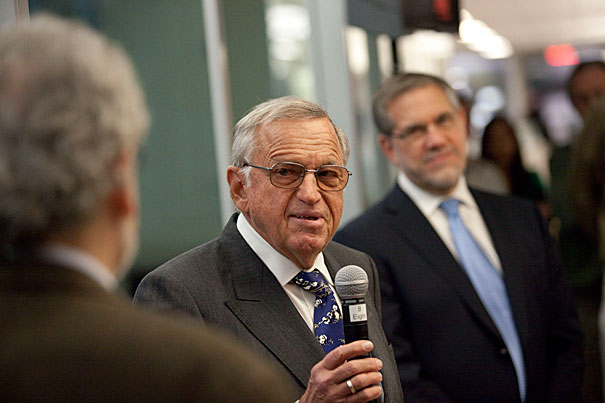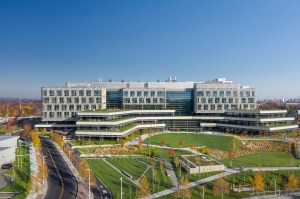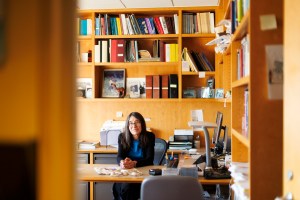
Wyss Director Don Ingber (left), Swiss engineer and businessman Hansjörg Wyss (center), and Harvard Provost Steven E. Hyman were at the inauguration of the Wyss Institute for Biologically Inspired Engineering’s Center for Life Science Boston building on Harvard’s Longwood campus. Wyss said he knows that the institute’s real gift is the enthusiasm and talent of its people. “That’s all you should care about, improving patient care,” he said.
Kris Snibbe/Harvard Staff Photographer
New facilities for Wyss Institute
Cambridge, Boston sites aim to help improve patients’ lives
With an exhortation from its biggest backer to conduct research that ultimately will improve patient care, the Wyss Institute for Biologically Inspired Engineering officially inaugurated two facilities Monday (Nov. 29), opening 60,000 square feet of office and laboratory space in Boston and Cambridge.
Harvard Provost Steven E. Hyman was among the speakers at the opening reception, held at the Wyss’ Boston facility, which takes up the entire fifth floor of the Center for Life Science Boston building on Harvard’s Longwood campus. Hyman called the institute’s rapid development “staggering” and praised Wyss Director Don Ingber, Judah Folkman Professor of Vascular Biology at Harvard Medical School and professor of bioengineering at the Harvard School of Engineering and Applied Sciences (SEAS), for his role in building the institute from almost nothing in less than two years.
“The success is breathtaking,” Hyman said.
Hyman said the institute, which also has space on the fourth floor of 60 Oxford St. in Cambridge, is creating a new model of how Harvard commercializes innovations from its laboratories.
The institute, which is dedicated to applying engineering lessons taken from nature, was begun auspiciously, with the largest-ever individual gift to the University. Swiss engineer and businessman Hansjörg Wyss donated $125 million in 2008 to establish the facility.
Wyss, who spoke at the opening, said that even though he doesn’t understand all of the scientific terminology spoken in the halls and labs, he knows that the institute’s real gift is the enthusiasm and talent of its people. He said that their research will have some real impact on patient care.
“That’s all you should care about, improving patient care,” Wyss said.
Ingber said that the bustling laboratory and office space was empty as recently as April and that the institute has grown from just three people when it began in the months after Wyss’ gift to nearly 200 today. Its staffers are engaged in projects led by 16 core faculty members and a group of associated faculty drawn from several Harvard Schools and affiliated institutions, including Harvard Medical School, the Faculty of Arts and Sciences, SEAS, and several affiliated hospitals.
Advances announced in recent months include customizable nanofabrics, which are extremely thin, elastic materials that may one day be used to regenerate heart and other tissue, and a “lung on a chip,” which combines lung tissue and blood vessels on a microchip and can be used in drug development and testing of environmental toxins’ effects on lung tissues.





